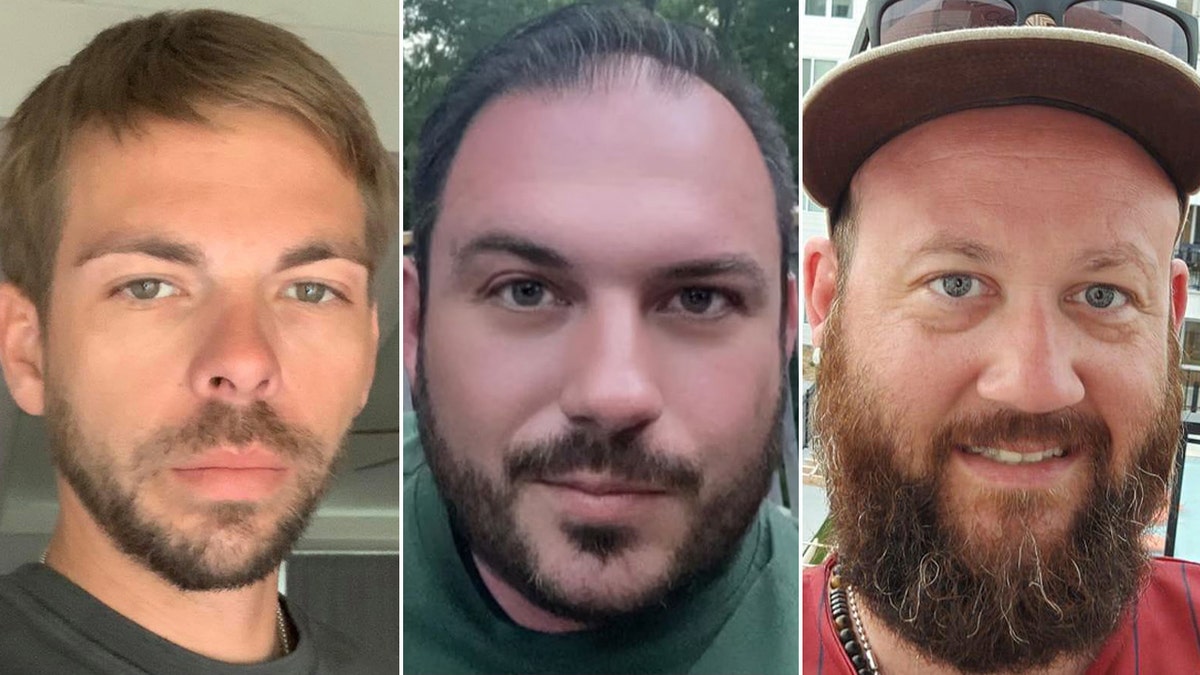Former law enforcement official stresses importance of toxicology report in mysterious deaths of Chiefs fans
Former Kansas Bureau of Investigation agent Currie Myers joined 'America's Newsroom' to discuss the latest on the case involving the unexpected deaths of three Kansas City Chiefs fans.
As their families wait for toxicology results to shed more light on the mysterious deaths of three Kansas City Chiefs fans, experts have told Fox News Digital a mix of drugs and frigid weather could have dealt the trio a lethal blow.
The bodies of Ricky Johnson, 38, Clayton McGeeney, 36, and David Harrington, 37, were discovered on Jan. 9, two days after they had gathered at friend Jordan Willis' home to watch the Chiefs play the Los Angeles Chargers.
The Kansas City Police Department has told Fox News Digital no foul play is suspected and "this case is 100% not being investigated as a homicide."
The men's families have accused Willis of playing an active role in the deaths, including allegations they were drugged.
PARENTS OF KANSAS CITY CHIEFS FAN FOUND DEAD THINK VICTIMS 'SAW SOMETHING THEY SHOULDN'T HAVE SEEN'

David Harrington, far left; Clayton McGeeney, second from right; and Ricky Johnson, right, were found dead in their friend's backyard two days after they had gathered to watch a Kansas City Chiefs game. (Ricky Johnson/Facebook)
The families cite Willis' attorney's changing narrative about the friends' final hours, his claims his client slept on his couch through much of the 48 hours that his friends were dead in his backyard and his role as a "brilliant scientist" with a Ph.D. working at a nonprofit developing immunizations.
Experts who spoke to Fox News Digital, though, all posited that the deaths were most likely accidental and caused by recreational drug use gone horribly awry.
"If they all took alcohol, they would not collapse around the same time. People react differently to large doses of alcohol, metabolize it at different speeds," forensic pathologist Dr. Michael Baden said. "They react to it, but they don’t react right away, [and] they’re conscious enough to go indoors if they feel like they’re going to pass out.
"It would be the type of drug that causes a person to be disoriented," Baden said, ruling out carbon monoxide because the men's bodies were found outside. "Fentanyl-type drugs can cause disorientation and can cause a rapid sleep-like loss of consciousness.
BROTHER OF CHIEFS FAN WHO WAS FOUND DEAD IN FRIEND'S BACKYARD SPEAK OUT, SAYS STORY 'NOT ADDING UP'
"If these four people all took it together, the guy on the couch sleeps it off for a long time, whereas the three who went outside disoriented, maybe didn’t have on their coats. Because of the freezing weather, it [could be] a combination of the drugs and hypothermia that caused their death."
Death from an overdose of fentanyl or a fentanyl analog, versions of the drug with a similar but slightly different chemical structure, isn't immediate, Baden said, and can take about an hour. When a fentanyl overdose takes place, naloxone can prevent users from going deeper into a coma after they lose consciousness.
"It isn't a sudden death in minutes," he said.

Family and friends of (L-R) Clayton McGeeney, David Harrington and Ricky Johnson are clamoring for answers after the three men inexplicably died in freezing temperatures outside their friend's Kansas City home. (Facebook)
But hypothermia sets in when the body's internal temperature lowers to 95 degrees or lower. Although temperatures weren't particularly low on the evening of Jan. 7 in Kansas City, hitting a low of around 29 degrees, Baden said a prolonged period in the snow in any weather under 32 degrees would be "cold enough" to kill a man.
"They probably aren’t dead when they collapse in the snow, but because of the cold they then go into a deeper coma and die from the hypothermia," Baden said. "They wouldn’t have died if they had gotten home all right. But if they were in the snow, they die in the snow. They don’t feel any pain or anything. They can’t wake up in time."
The theory the four men consumed a drug laced with fentanyl would support Willis' claim that he slept for all or most of two days after his friends visited his house, Baden pointed out.
"Because of the freezing weather, it [could be] a combination of the drugs and hypothermia that caused their death."
Powdered fentanyl can be mixed with drugs like heroin, methamphetamine and cocaine or pressed into pills that look like prescription opioids. Police in Alabama, Illinois, Louisiana and New York have reported finding the synthetic opioid in marijuana.
Two of the three grieving families have told Fox News Digital detectives have reached out asking for passcodes to their sons' phones. In all likelihood, the Kansas City Police Department is trying to determine whether drugs were sold or given to any of the men and establish a chain of possession, attorney and retired NYPD inspector Paul Mauro said. That process may further delay the investigation.
Although Willis is not facing criminal charges and has not been accused of any wrongdoing by police, he could be charged with drug-induced homicide or manslaughter if he were found to be the supplier of the deadly drugs, the experts all said.
5TH MAN CONTRADICTS KANSAS CITY CHIEFS FANS' PAL ABOUT MEN'S DEATH

Clayton McGeeney, Ricky Johnson and David Harrington were found dead at Northwest 83rd Terrace, pictured, two days after they watched the Kansas City Chiefs game there. (FOX4 KC)
"I would think that now they have to try to jailbreak the phones [if they can't get passwords] which is very difficult to do these days," Mauro said. "Most of these phones … a lot of the data default to the cloud. You can get a cloud search warrant. Instead of having the password, you’re not going to get in with the thumbprint.
"The person needs to be alive. If you aren’t alive, you don’t have the necessary heat or electricity. There are some workarounds, but the bottom line is, if they don’t have a password they’re going to have a hell of a time getting in there."
Although the deaths of McGeeney, Johnson and Harrington have garnered interest nationwide, the phenomenon of mass overdose deaths is more common than one might realize, retired DEA special agent Derek Maltz said.
"If I had to bet my pension, they were drinking, they smoked weed, the weed was laced with K2, they overheated and threw themselves into the snow,"
In a presentation to the House of Representatives' Committee on Homeland Security in 2023, Maltz was able to compile 70 pages of news articles from 2023 on deaths of three or more victims, and some with more than 10 or even 20, who died at once from the drug – sometimes thinking it was a "safer" substance, and other times through innocuous items like a lollipop.
"This is happening in every state," Maltz told Fox News Digital. "Everyone is so fixated on 'three people dead, they were frozen to death in the backyard.' But they don't know that this is happening all the time in multiple states all across the country every day. People are not putting this together. The news is just reacting to stuff instead of understanding what's really happening. That's where it gets really sad for me. The more we talk about it, it's just people continuing to die."

Ricky Johnson, right, was a "responsible" man who "wasn't going to go outside and freeze to death," his parents told Fox News Digital. (Norma Chester)
Although he stressed that it was just a theory, Maltz said he thought the Kansas City tragedy was "a clear case of cocaine laced with fentanyl."
However, he said, other drugs could cause a fast-acting, disorienting effect, including synthetic opioids like nitazenes and horse tranquilizer xylazine, that he said are being produced in Chinese labs.
"This is happening in every state."
But Baden, Mauro and Maltz all expressed that if the substance were a fentanyl derivative or a synthetic, it may be difficult for less-equipped labs to detect in an autopsy report, potentially requiring Kansas City's Frontier Forensics Midwest LLC to outsource testing and delay results further.
"They may not have the capacity. I hope they have the wherewithal to say, 'Our lab can’t do this’," Mauro said. "I hope the cops are thinking this way. If they just test for heroin, and it’s a synthetic, it's not going to show. I hope that they know to test for it."
Mauro also theorized that K2 or "spice," a synthetic marijuana sometimes passed off as the real thing or used by those who want to avoid positive marijuana results on drug tests, could have been the offending substance.
CLICK HERE TO GET THE FOX NEWS APP
K2 often causes hyperthermia, a dramatic rise in body temperature. MDMA, cocaine and amphetamines can also cause users to overheat.
"If I had to bet my pension, they were drinking. They smoked weed. The weed was laced with K2. They overheated and threw themselves into the snow," Mauro said. "Let's say he went out for a cigarette or something. It doesn’t matter how drunk you are – in that area it hits you."




